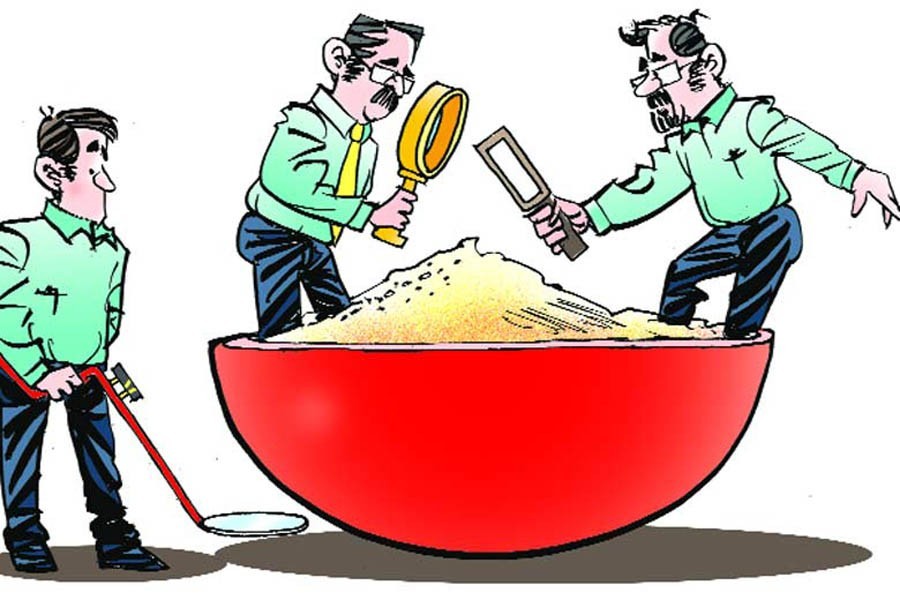
Published :
Updated :

While food security should be the prime concern for a country like Bangladesh, it is unsafe food that also figures prominently, albeit threateningly, in most of its parts, especially in the urban areas. Ensuring safe food for all remains a major challenge as there is neither any systematic effort, nor effective intervention to keep food chain safe -- from farm to plate. With population growth and increasing pace of urbanisation, new concerns about food safety and nutrition are emerging. These among others include non-availability of enough nutritious food, poor food quality and the accompanying health hazards from adulteration and so on.
The central regulatory body, Bangladesh Food Safety Authority (BFSA), established years ago to specifically look into the matter, is far from being effective for lack of technical expertise and adequate manpower. Its activities are confined to cities, mainly to the capital Dhaka, and focused mostly on awareness campaigns. There are occasional drives in kitchen markets, restaurants and super-markets -- usually in big cities. Fines are imposed, sometimes heftily; even criminal proceedings are also filed. But these do not appear to have changed the situation at all. In the absence of any corrective measures - punishing offenders is not always the appropriate method of correction - it all ends up in some 'revenues' earned by the law enforcers. Between July 2017 and September 2018 mobile courts conducted at district level realised Tk 2.7 crore in fines from 4,255 people for producing or selling unsafe food, according to data compiled by the (BFSA).
It is clear that the raids by mobile courts have not been able to leave any noticeable impact on the quality of food products. For all practical purposes, punitive measures should be backed by actions to improve the quality and standard of food of all varieties. To monitor the situation, inspection and sudden raids are welcome, but the fact that must not be forgotten is that inspection is just one of the elements to ensure safe food. But the way the authorities keep drumming up anti-adulteration drives, it seems too much emphasis is being given on punishment, believing it alone would do the rest of the job.
That the authorities are wrong has been amply proved by the ever-increasing incidents of adulteration. Observers hold that it is a broad-based -- perhaps a country-wide -- network that devious business people find highly profit-driven. Fining big stores or restaurants or kitchen markets does not help much. Worse, it provides undesirable leverage to those in charge of calling the shots.
Several studies reveal widespread contamination in and adulteration of a wide range of foods from powdered baby milk to drinking water.
Agricultural products are found contaminated with high pesticide and antibiotic residues while gaping leaks across value chains expose them to widespread microbial contamination. Harmful dyes are used to colour foods. Fertiliser ingredients like ammonium nitrate are found in sweets and bakery items to extend shelf life. Industrial grade ethephon and carbide are used for ripening fruits, especially mangoes. Restaurants are hardly found following hygiene codes. Food safety and health experts see a link between the rising trends in non-communicable diseases and consumption of substandard and unsafe foods.
While contamination of food can be due to negligence, deliberate adulteration by toxic chemicals or radioactive materials for long shelf life of products and increasing the volume in size and weight, among the many crooked methods, is so rampant that it is difficult to find anyone who has not encountered an unpleasant moment of food-borne illness at least once in the past year. While some illnesses may be self-limiting, some can be very serious and even life-threatening. Taking care of the situation thus calls for a whole package of initiatives. In advanced countries this involves producing, handling, storing and preparing foods in such a way as to prevent infection and contamination in the entire chain. However, in situations such as in this country, it is not merely about maintaining a clean chain but putting in strong deterrents so that criminality in the business could be stopped. Availability of harmful stuffs must not be encouraged, if necessary, by way of a ban on imports or local production. Strong advocacy on the detrimental effects of consumption should be routinely done. At the same time, training on safe and scientific methods of preservation of food products should also be a high priority in an attempt to curb adulteration.
It was reported in the newspapers sometime ago that the Netherlands government is providing a grant of USD 12.5 million to implement a project aiming to develop safe, sustainable and resilient food system for the Dhaka metropolitan area. This is expected to be achieved through a model system for food distribution and interventions to improve the performance of food chain with the ultimate objective of having strategic food agenda-2030. Special emphasis will be placed on the role of women and poor peoples to explore and evaluate alternative strategies to improve access to safe, healthy and nutritious food. A central outcome will be the creation of a consultative group of involved stakeholders to provide inputs to the government policies on future development of the system.
While there is a definite need for developing such model systems for improved food chain and distribution, the immediate task for the concerned agencies is to ensure compliance of the rules, hygiene codes etc in a regular and systematic manner, and to do this, attention has to be on the entire supply chain including farm-level production of primary, intermediate and final products.


 For all latest news, follow The Financial Express Google News channel.
For all latest news, follow The Financial Express Google News channel.